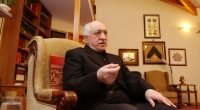What’s Friendship Got to Do With [Mr. Gulen’s] Extradition?

Date posted: August 10, 2016
Nicholas Danforth
America and Turkey are heading towards a slow-motion train wreck over Turkey’s demand that the United States hand over Fetullah Gülen, a Turkish cleric living in Pennsylvania who may have played a role orchestrating Turkey’s recent coup attempt.
To extradite Gülen, the Turkish government will need a favorable political decision from the State Department and a favorable legal decision from a Pennsylvania judge. Yet Ankara continues to dismiss the legal component of the process, as if political pressure alone is sufficient to secure Gülen’s extradition. In doing so, Turkey not only weakens its legal case but erodes the political support that will be necessary as well. The Wall Street Journal reported that the State Department remains unconvinced by Turkey’s extradition case. The stage is now set for a collision between Turkey’s demand for justice and the demands of the U.S. justice system. Unfortunately, the U.S.-Turkish alliance will feel the brunt.
The stage is now set for a collision between Turkey’s demand for justice and the demands of the U.S. justice system.
“What kind of partners are we,” Turkish President Recep Tayyip Erdoğan recently asked of America, “if you request documents when we ask for a terrorist?” It’s a question that Margaret Thatcher might have asked, albeit more politely, during the 1980s, when a failed attempt to extradite a Provisional Irish Republican Army (PIRA) militant revealed that even America’s most special international relationships are subject to the restrictions of the U.S. legal system.
In May 1980, PIRA member Joe Doherty shot and killed a British soldier in Northern Ireland. Doherty was captured, tried, and convicted for the killing in the UK. He later escaped from Crumlin Road Jail in June 1981 and fled to the United States, where he was rearrested in June 1983. The U.S. executive branch strongly supported extradition, both on account of the special relationship with the United Kingdom and the Reagan administration’s explicit focus on combating terrorism. And the case took on a special significance for Thatcher, especially when two months before Doherty’s extradition hearing, a bomb exploded at a hotel in Brighton, nearly killing Thatcher and members of her cabinet. Nonetheless, John E. Sprizzo, a federal judge for the U.S. District Court for the Southern District of New York, ruled that Doherty’s crimes were non-extraditable according to a controversial but widespread exemption barring extradition in the case of political offenses.
If the U.S. government couldn’t bend the law for the Iron Lady, it is unlikely to do so for Erdoğan.
Sprizzo’s decision infuriated the Reagan administration. A top Justice Department official called the ruling “outrageous” and claimed that it made the U.S. legal system “complicit in terrorism.” But of course the administration was bound by the judge’s decision, which it subsequently appealed multiple times to no avail. In the end, it required the negotiation of a new extradition treaty in 1985 before Doherty and several other fugitive PIRA members could eventually be sent back to the United Kingdom. However, Doherty’s case differs from Gülen’s in an important way: Doherty’s guilt was never in question, only the political nature of his crime. With Gülen, the judge will also have to decide that Turkey’s evidence represents probable cause for implicating Gülen himself, and not simply his followers, in the coup attempt. Even if this standard is met, however, Turkey’s fervent demands for extradition may provide further grounds for Gülen to seek a political exemption.
Suffice it to say, if the U.S. government couldn’t bend the law for the Iron Lady, it is unlikely to do so for Erdoğan. And the more Ankara demands it, the more Americans will recoil. While the question of whether Gülen would receive a fair trial in Turkey will not be considered by U.S. courts, it will inevitably factor into the Obama administration’s calculus, alongside the question of whether Gülen might be tortured if sent to Turkey. Deriding the need for evidence while flaunting pictures of badly beaten coup plotters makes extradition all the more politically unpalatable, no matter how geostrategically convenient it might be.
The decision on Gülen’s extradition will ultimately rest in the hands of a judge whose job is to not care about the political consequences.
On a visit to Washington to lobby for Gülen’s extradition, Nationalist Action party parliamentarian Kamil Aydin expressed his belief that “America is going to refuse losing Turkey as a good partnership in the region.” But even if Turkish politicians do not believe that America operates according to the rule of law, they should at least be aware that most Americans are proud to think that it does. Turkish commentators, for example, have eagerly brought up Guantanamo Bay as proof of the U.S. government’s willingness to violate its own principles. But do they really expect that an argument about U.S. hypocrisy would in turn convince the U.S. government to act against its principles on Turkey’s behalf? Treating Gülen’s extradition as an issue in which the U.S. government can be bullied into compliance risks offending Americans’ amour propre to the point where many conclude, as Stephen Kinzer wrote for The New York Times, handing over Gülen would be “a compromise too far.”
Turkish leaders are undoubtedly correct in saying that if the United States fails to extradite Gülen it will deeply damage U.S.-Turkish relations. That should worry them, since it is entirely possible that in the absence of more compelling evidence, the U.S. justice system will reject their demands and in doing so, potentially endanger one of Turkey’s most important alliances. Even if the U.S. government provides all the support it can, the decision on Gülen’s extradition will ultimately rest in the hands of a judge whose job is to not care about the political consequences.
Source: Bipartisan Policy Center , August 8, 2016
Tags: Democracy | Gulen extradition | Military coups in Turkey | North America | Turkey | USA |
























